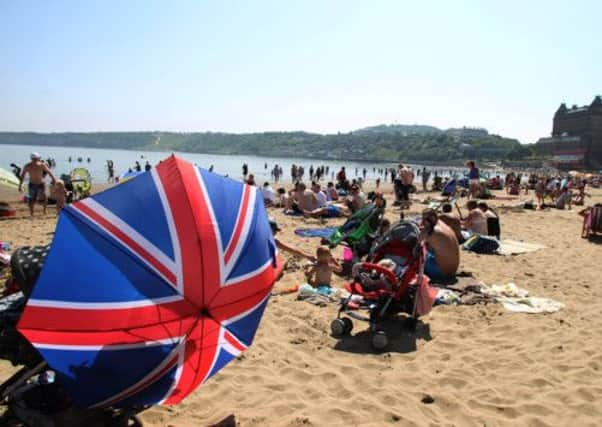Bather, 69, dies as dip at resort ends in tragedy


As holidaymakers basked in the blazing sunshine, emergency services were called to the beach on Roman Bank in Ingoldmells, shortly after midday.
Officers from Lincolnshire Police said the 69-year-old woman’s death was not being treated as suspicious.
Advertisement
Hide AdAdvertisement
Hide AdPolice and fire chiefs also reiterated warnings about escaping the soaring temperatures by swimming in open water, after a number of deaths in recent days.
Paul Mudd, acting director of operations at the Yorkshire Ambulance Service, said yesterday: “The county’s many waterways are popular destinations for people during the summer months, which can make them dangerous places for those who take risks.
“It may be very appealing to jump into the water to cool off on a warm summer’s day, but people need to be aware of how dangerous it really is.
“Water can look calm on the surface but contain unseen debris and, rivers in particular, can have treacherous undercurrents.
Advertisement
Hide AdAdvertisement
Hide Ad“Furthermore, the temperature of deep water is much colder than people would expect and, even on a hot summer’s day, rarely gets above freezing.”
Gritting teams were also out trying to deal with melting roads across Yorkshire yesterday as temperatures soared above 30C.
Wakefield Council said it was spreading stones on some routes to keep them safe, while gritters were also out across other authorities including Bradford, Barnsley and Kirklees.
Bosses at the North York Moors and Peak District national parks issued fire alerts, after devastating wildfires ripped through parts of the country including the south Wales valleys and Tentsmuir Forest in Scotland.
Advertisement
Hide AdAdvertisement
Hide AdBernie McLinden, the North York Moors National Park Authority’s head of park management, said: “Past episodes have shown that under these tinderbox conditions, moorland fires can spread extremely quickly causing significant damage to the landscape and its wildlife.
“The majority of moorland fires can be prevented so we would urge people to take extra care when visiting the national park while the fire risk signs are in place.”
Extra patrols are being carried out in the Peak District national park to try and prevent fires.
Andy Farmer, the Peak District National Park Authority’s head of field services, said: “Moorland fires can cause considerable environmental damage to fragile moorland ecosystems.
Advertisement
Hide AdAdvertisement
Hide Ad“Wildlife or farm animals can be caught in the flames with horrific results.”
He added: “If people see anyone acting suspiciously on the moors we ask them to report it to the police.”
Insurers yesterday warned wildfires could put lives at risk and cost millions of pounds in damaged crops and machinery.
Tim Price, of NFU Mutual, said: “The tinder-dry conditions and continuing heatwave pose a major fire risk to the countryside, threatening crops, equipment and even personal safety.
Advertisement
Hide AdAdvertisement
Hide Ad“Every precaution needs to be taken by both farmers and visitors alike.”
The weather, meanwhile, is expected to get even hotter.
Temperatures reached 32.2C (90F) on Wednesday and are expected to rise to around 33C next week. Forecasters said there was a “slim” chance they could even hit 35C in the south on Tuesday or Wednesday.
Paul Mott, a forecaster with MeteoGroup, said temperatures would cool slightly today in many areas, but could reach 28C in the Highlands.
He said: “It looks likely that the heatwave will return in the early part of next week when temperatures will be back in the low 30s.”
Advertisement
Hide AdAdvertisement
Hide AdThe weather is then expected to become more humid, bringing showers and thunderstorms in the west between Monday and Wednesday, with the possibility that the mercury could rise to 35C.
“There is a slim chance that we could see temperatures much higher than we have done,” Mr Mott said.
But they are unlikely to top the high of 36.5C recorded in Surrey in July 2006.